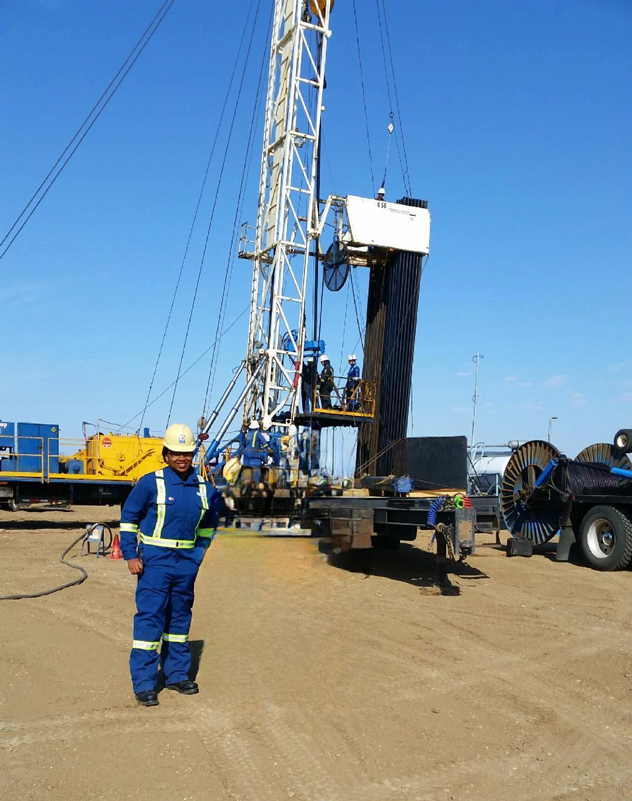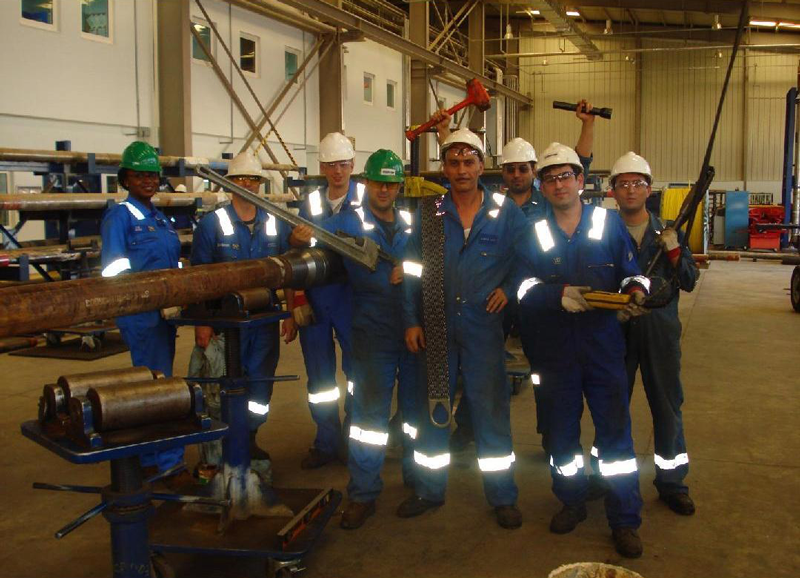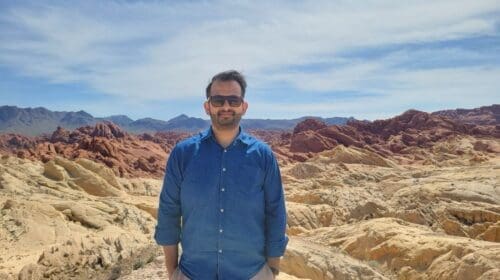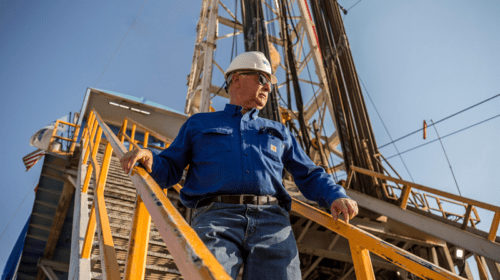Rebecca Ponton: How did you decide to become a petroleum engineer? What motivated you to then earn a master’s in chemical engineering?
Maureen Nwangene: My journey toward becoming a petroleum engineer was strongly rooted in a lifelong passion for STEM that emerged during my secondary school years. This organic interest steered me naturally toward the field of engineering as a career choice. However, what truly ignited my path towards petroleum engineering was a combination of my fascination with complex challenges, and a deep desire to contribute meaningfully to the energy sector.
Growing up in the Niger Delta Basin in Nigeria, I was constantly exposed to the energy industry. The sight of flare stacks during my childhood travels sparked a profound curiosity in me about the scientific and technical aspects of energy production. This early exposure influenced my decision to specialize in petroleum engineering, driving me to pursue a bachelor’s degree in the field.
Upon entering the oil and gas industry as a field engineer, my initial assignments predominantly revolved around reservoir optimization. As I immersed myself in these projects, I quickly realized that a comprehensive understanding of the reservoir was vital for success in this domain. It was during my involvement with sand face completions that I became particularly intrigued by reservoir characterization and management. I desired to seamlessly interact amongst engineers and geoscientists, and this urge served as a catalyst, motivating me to delve deeper into the intricacies of reservoir dynamics. Recognizing the fundamental role that a broader knowledge base could play in advancing my career, I made the decision to pursue a master’s degree in chemical and petroleum engineering with a specialization in reservoir characterization.
RP: What inspired you to pursue a career in oil and gas? How did you secure your first job in the industry?
MN: My decision to pursue a career in the oil and gas industry was significantly influenced by a combination of factors that shaped my interest and eventual entry into this field. Stemming from my genuine passion for STEM subjects and early exposure to the energy sector, I had a pivotal moment during my senior secondary curriculum when I was deeply impacted by a field trip to the petrochemical refinery in Eleme, Rivers State, Nigeria. Witnessing the oversized equipment and understanding its fundamental role in bolstering a nation’s economy left a permanent impression on me. In that moment, I realized that being part of this industry was where I truly wanted to contribute and belong.
While working toward my bachelor’s degree in petroleum engineering, a crucial opportunity arose in the form of a six-month internship. Fate seemed to align perfectly when I was accepted by a reputable drilling company. However, what set this experience apart was the management’s recognition of my drive and enthusiasm. They entrusted me with field responsibilities, diverging from the typical office-based tasks designated for interns. This hands-on exposure in the field not only honed my skills, but also significantly expanded my network within the industry.
The internship became a turning point that led me to secure my first job in the oil and gas sector shortly after graduating. Leveraging the connections and practical experience I had gained during my internship, I was able to navigate into a professional role within a well-respected organization. The foundation laid during that pivotal internship granted me insight into the industry’s workings and also served as a launchpad for subsequent career opportunities.

RP: Please talk about your current role and what you do.
MN: I am grateful to be part of the California Geologic Energy Management (CalGEM), a division within the Department of Conservation focused on managing California’s energy, land and mineral resources responsibly. In my role as the Monitoring and Compliance Unit Supervisor, I have been instrumental in managing diverse responsibilities.
One of the key aspects of my role involves meticulously managing the division’s monitoring and compliance strategies across various permitting programs at the division. This entails designing, implementing and overseeing robust frameworks that guarantee strict compliance with established regulations. To achieve this, I supervise a team and provide [the members] with the necessary guidance and technical directives essential for the effective execution of their duties within the Monitoring and Compliance Unit.
Drawing upon my expertise and experience, I’ve been intricately involved in the development of statewide processes and procedures aimed at ensuring compliance across various programs within the division. Through effective leadership and careful supervision, I have guided the Monitoring and Compliance Unit in shaping technical directives and overseeing program activities to maintain rigorous compliance standards.
RP: As a Black female in a white, male-dominated industry, how have you been received? Who have been your role models and mentors? Where have you looked for and found inspiration?
MN: Navigating a predominantly male-dominated industry has indeed posed challenges, albeit more centered on gender biases rather than racial disparities, especially considering my international experiences. I’ve noticed that the predominant culture at various work locations often aligns with the majority race or color in that region.
Upon entering this industry, I encountered immediate challenges during my internship, notably facing accommodation issues in the field due to the inability to share living spaces with male colleagues. This logistical hurdle restricted my access to certain field experiences. Moreover, early on, some work environments were not entirely receptive to women wearing coveralls, making it apparent that gender stereotypes were prevalent.
However, amidst these challenges, I was fortunate to encounter a few individuals who transcended these stereotypes. They recognized my capabilities and determination, disregarding gender biases. These men taught me, and have been valued mentors throughout my career, offering guidance and support from the inception of my journey to this day.
Undoubtedly, my primary role models are my parents. Despite limited education, they instilled in me the belief in the extraordinary and the importance of hard work and self-belief. Their resilience and unwavering support have been a constant source of inspiration. I draw additional inspiration from the countless women who have displayed courage in the face of adversity. These remarkable women, often found in our everyday lives, serve as beacons of strength and resilience, motivating me to persevere in challenging situations.
RP: What guidance would you give to other young women and minorities who have an interest in the oil and gas industry? Do you have any ideas on how the energy sector can attract more women and other minorities to create more diversity?
MN: My guidance for young women and minorities interested in the oil and gas industry would be to focus on pursuing STEM education and actively seek internships or entry-level positions within the sector. Networking, identifying mentors, and advocating for oneself are crucial elements for success in this field.
As a woman in the industry, I encountered a notable challenge stemming from physical strength limitations. Despite being fit and healthy, there were inherent differences in physical capabilities between men and women that affected certain tasks. Recognizing this, I focused on leveraging my intellectual strengths. I established expertise in software, operating procedures, materials, leadership, organization and project management. Demonstrating my proficiency in these areas allowed me to showcase my value as a reliable team member, compensating for physical limitations.
To promote diversity within the energy sector, implementing inclusive recruitment practices is key. Providing mentorship opportunities and fostering supportive work environments that genuinely value diverse perspectives can make a significant difference. With the evolving landscape of roles and increasing automation in the industry, there are now even more opportunities for women to contribute substantially within teams and organizations.
By looking beyond activities reliant on physical strength, individuals can identify and develop other skill sets to contribute meaningfully.
The industry can attract more women by purposefully hiring women and creating infrastructure that accommodates them. Providing opportunities for minorities in their local regions and allowing exploration in different locations can also enhance diversity. Celebrating and recognizing the contributions of women within the industry is crucial. Additionally, breaking barriers by promoting qualified women to top leadership roles, irrespective of traditional club affiliations, fosters a more inclusive and diverse industry culture. Embracing our unique strengths and the varied perspectives we bring to the table is vital for progress.

RP: What professional and technical aptitudes do you think will be crucial in the near term based on your experience?
MN: Based on my experience as an engineer in this field, I have found that in the dynamic landscape of the oil and gas industry, certain professional and technical aptitudes have become increasingly critical. First, like every other industry, proficiency in data analytics and digital technology has emerged as a cornerstone skill set. The industry is progressively moving toward data-driven decision-making processes. Engineers who possess a deep understanding of data analytics, machine learning, and artificial intelligence applications can derive valuable insights from vast datasets, optimizing operations and enhancing efficiency.
Moreover, expertise in sustainability practices and environmental considerations has become indispensable. As the industry undergoes a transformative shift toward sustainable energy sources, engineers must adapt and embrace innovative technologies that promote environmentally friendly practices, such as carbon capture, utilization and storage (CCUS) techniques.
Adaptability and agility are also crucial traits. The industry landscape is dynamic, facing constant technological advancements, regulatory changes and market fluctuations. Engineers who can swiftly adapt to new methodologies, tools and industry trends will thrive in this rapidly changing environment. Collaboration and interdisciplinary skills are increasingly valued. Cross-disciplinary collaboration between engineers, geologists, environmental scientists and other professionals is vital for comprehensive problem-solving and innovative solutions in complex projects. Additionally, a strong foundation in safety protocols and risk management is non-negotiable. Engineers need to prioritize safety in all operations, implementing robust risk assessment strategies to ensure a safe working environment.
Finally, effective communication skills are essential. Engineers must articulate technical information clearly to diverse audiences, including stakeholders, non-technical personnel and regulatory bodies. The ability to convey complex technical concepts in a comprehensible manner is invaluable.
RP: Ultimately, what would you like to accomplish in your career?
MN: As a mid-career professional who’s traversed pivotal sectors within the energy industry – ranging from oilfield services to working with oil and gas operators and governmental agencies – I’ve gained a comprehensive 360-degree perspective. My extensive international experience has exposed me to diverse cultures and fluctuations within the industry, providing a nuanced understanding of how various segments collaborate for effective energy management. Equipped with this multifaceted insight, I’m deeply motivated to be an agent of change and progress within the industry. My ultimate career goal revolves around continuing to make substantial contributions to the energy sector, particularly in advancing sustainable practices and championing diversity.
My aspiration is to take on leadership roles that empower me to drive positive transformation. I aim to lead initiatives that foster innovation, implement sustainable solutions, and pave the way for a more inclusive and diverse industry landscape. Ultimately, I want to inspire and mentor the next generation of professionals, nurturing its potential and encouraging them to envision a more sustainable and diverse future for the energy industry. By leveraging my experiences, insights and passion, I aspire to leave a lasting impact on the industry, creating a legacy of positive change and advancement for generations to come.
RP: Please share any final thoughts you might have.
MN: Building my career in the energy sector has been both enriching and demanding, and I’m deeply committed to using these experiences to empower others and champion diversity and inclusivity within our industry. I firmly believe that embracing diversity isn’t just a moral imperative, but a catalyst for innovation, driving us toward a more sustainable future across the energy landscape and beyond. True diversity goes beyond token gestures; it’s about fostering equal opportunities for everyone.
Over the past two decades, we’ve seen a notable increase in women ascending the ranks of the industry. Now, these accomplished women can serve as mentors for younger generations, a shift that wasn’t prevalent when I started. I lacked female role models in the industry but, now, intragender mentorship is crucial for fostering diversity and ensuring everyone has the chance to thrive. Encouraging and nurturing this intragender mentorship is vital. It allows us to tap into a wealth of perspectives and experiences, ultimately fostering a more inclusive and supportive environment. As we continue this journey, let’s remain steadfast in our commitment to promoting diversity, equal opportunities and intergender mentorship, shaping a more vibrant and innovative future for the energy industry.
Rebecca Ponton has been a journalist for 30+ years and is also a petroleum landman. She is the author of Breaking the GAS Ceiling: Women in the Offshore Oil and Gas Industry (Modern History Press; May 2019). She is also the publisher of Books & Recovery.
Oil and gas operations are commonly found in remote locations far from company headquarters. Now, it's possible to monitor pump operations, collate and analyze seismic data, and track employees around the world from almost anywhere. Whether employees are in the office or in the field, the internet and related applications enable a greater multidirectional flow of information – and control – than ever before.










